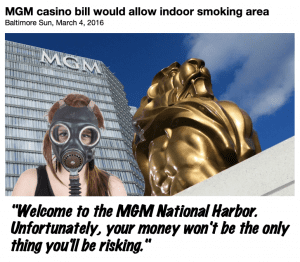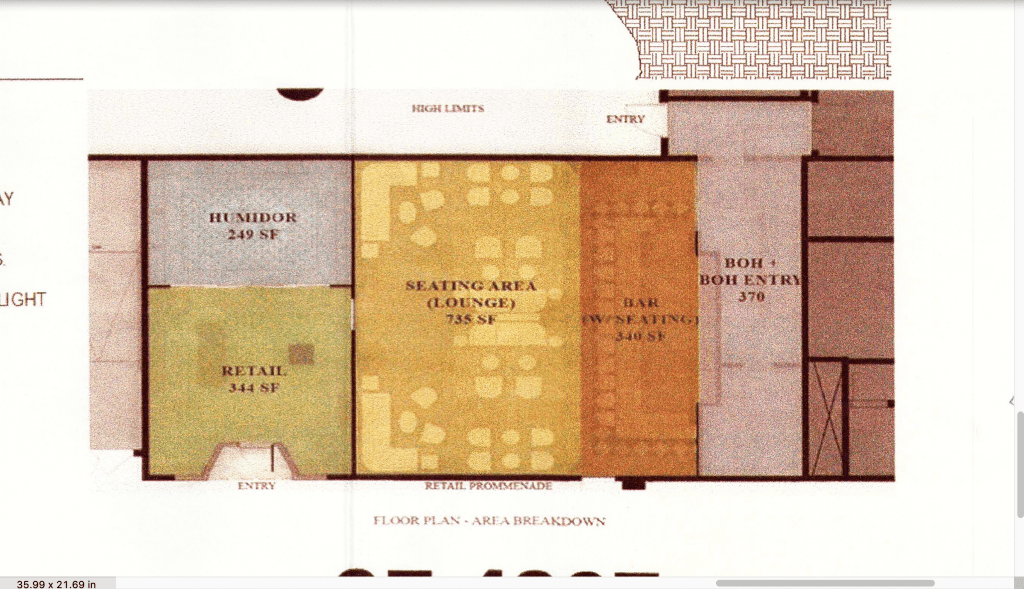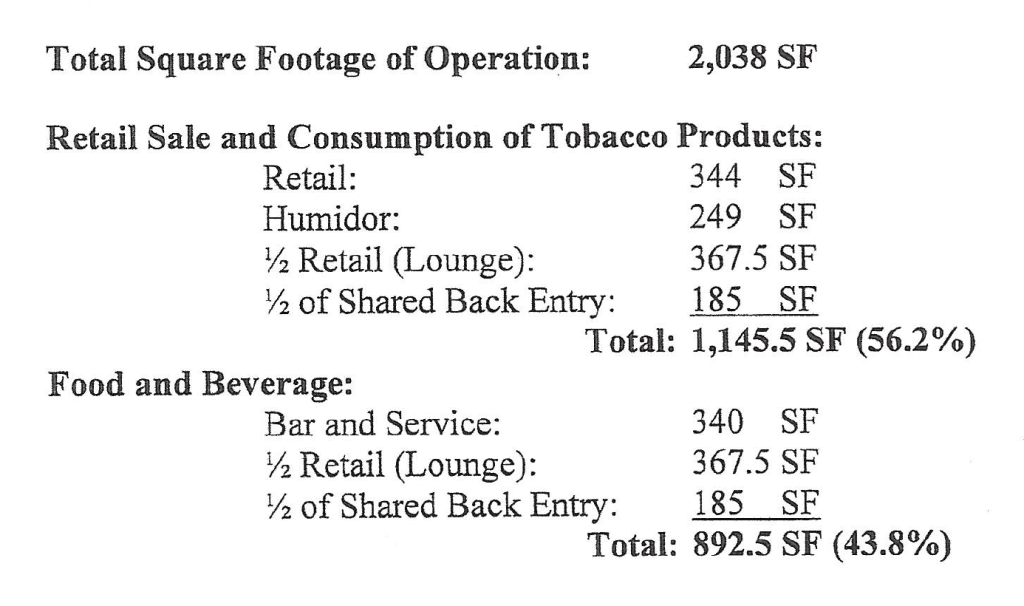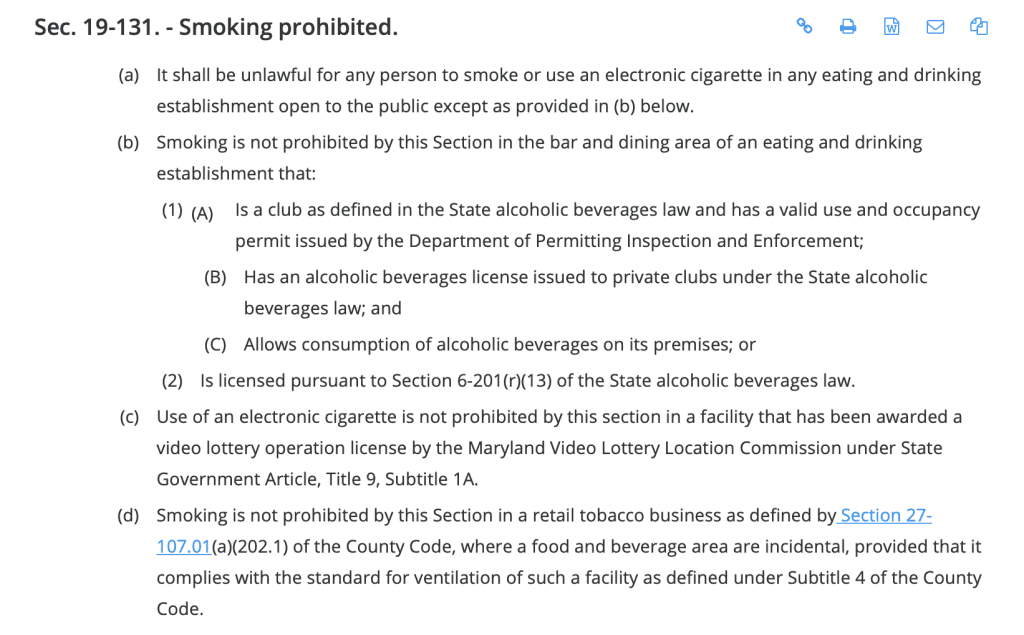 This article discusses two arguments related to the licensed sale and consumption of alcoholic beverages that should cause the Prince George’s County Zoning Hearing Examiner to disapprove the application by MGM for an exemption to the Maryland Clean Indoor Air Act. This article does not address additional, compelling arguments related to the harmful effects of secondhand smoke to MGM National Harbor employees and customers.
This article discusses two arguments related to the licensed sale and consumption of alcoholic beverages that should cause the Prince George’s County Zoning Hearing Examiner to disapprove the application by MGM for an exemption to the Maryland Clean Indoor Air Act. This article does not address additional, compelling arguments related to the harmful effects of secondhand smoke to MGM National Harbor employees and customers.
Prince George’s County zoning regulations do, in fact, permit the establishment of a Retail Tobacco Business where smoking is permitted. “The Devil,” as the old adage goes, “is in the details.” In this case, the application by MGM is for a facility that also allows for the sale and consumption of alcohol.
It is MGM’s contention that the exemption should be granted by the county by virtue of the county approving MGM’s plans for a “Retail Tobacco Business” to be located completely inside the casino complex ¬– without doors or windows accessible from the outside of the building. This cigar lounge will be on the retail concourse, attached to its National Harbor casino near the main casino entrance.
The first image below is the floor plan for the cigar lounge as provided by MGM’s attorneys pending the forthcoming Zoning Hearing Examiner’s hearing which is expected to occur sometime in February.

This second image/table below shows the breakdown of the cigar lounge floor space for different purposes. Note that the table divides the total space into two sections, one for the retail sale and consumption of tobacco products. The other portion is for the “incidental” sale of food and alcoholic beverages. As you’ll see in a moment, this division of space is not definitive, but is made to give the facility the appearance of being consistent with county law.

Argument 1. Smoking is not permitted
in an “indoor area open to the public.”
Subtitle 5 of Title 24 of the Health General Article of the Maryland Code is the “Clean Indoor Air Act.” It is a state law, the authority of which supersedes local county and city law.
Note, in the screenshot below, how Section 24-501(e) defines an “indoor area open to the public”…

In (e)(2) in particular, an “indoor area open to the public” is defined as…
An indoor area of any establishment licensed or permitted under the Alcoholic Beverages Article for the sale or possession of alcoholic beverages.
(The bold and italicized type above are our doing.)
Section 24-504 prohibits smoking in an indoor area open to the public. See the screenshot below for the text of this section…

In other words, “A person may not smoke in an indoor area open to the public.” Simply put, according to the Maryland Clean Indoor Air Act, no one is allowed to smoke in a place where alcohol is licensed because, by definition, that space is “an indoor area open to the public.” The point is that, according to state law, smoking is not allowed in indoor places where people are legally allowed to drink.
Argument 2. The other uses of the area defined by the floor plan
do not amount to “incidental” uses as required by state and county law.
According to Section 24-505, paragraph 3, the Maryland Clean Indoor Air Act does not restrict smoking in…

To restate the point from the screenshot above, according to state law…
Smoking is allowed in a retail tobacco business in which the primary activity is the retail sale of tobacco products and accessories, and the sale of other products is incidental.
While state code does not define “incidental,” Prince George’s County code Section 27-107.01 defines a “Retail Tobacco Business” as follows, in terms of floor space…

Note, in the last line of the text above, that “incidental” uses are now more explicitly defined as the sale of food and/or beverage “provided the gross floor area of the food and or beverage area does not exceed forty-nine percent (49%) of the gross floor area.”
In the lower portion of the table shown above, provided by MGM’s attorneys, you’ll notice that only 43.8% of the floor space in the Retail Tobacco Business is to be used for “incidental purposes.” They’re “incidental” in that they are not essential to the retail sale of tobacco products.
The table comes to this total 43.8% by assigning only half (367.5 SF) of the “Retail (Lounge)” or “Seating Area” for incidental uses. In fact, according to the floor plan, there is nothing to stop patrons of the cigar lounge from drinking alcoholic beverages anywhere they choose to sit in the total “Seating Area.” Keep in mind that the alcoholic beverage license which MGM has now or will obtain covers 100% of the “Seating Area” and other spaces in the total 2,038 SF into which patrons might carry and consume their alcoholic beverages.
Adding back the other half of the “Retail (Lounge)” raises the total floor area used for incidental purposes – for food and/or licensed alcoholic beverage services – to 1260.0 SF or 61.8% of the total floor space which is well in excess of the maximum 49.0% that county law allows in order to permit smoking.
And the 1260.0 SF doesn’t include other spaces inside MGM’s Retail Tobacco Business where drinking might occur.
The distinction MGM has made in the table shown above, between the floor area allocated for retail tobacco sales/smoking versus incidental activities, is arbitrary and meaningless. And the 1260.0 SF doesn’t include any of the huge gaming floor in the casino proper that is readily accessible through the rear entrance to the cigar lounge. If anything, it’s tobacco retail sales that is incidental to the facility for which MGM is requesting approval.
Plain and simple, it’s a bar, a convenient smoking room for the casino’s high limit and other patron’s. Retail tobacco sales are just an excuse. If the county doubts this conclusion, ask MGM to move the shop away from the casino entrance, much farther down the retail concourse, without a rear entrance to the casino for use except in emergencies. And have MGM obtain a separate liquor license for the space instead of covering it under the umbrella of their casino license. If MGM is serious about going into the retail tobacco business… If that’s the real purpose of this cigar lounge, MGM will have no trouble complying.
The cigar lounge which MGM is asking the county to approve for smoking is a bar in which state law prohibits smoking.
On a related point… The county’s definition of “Retail Tobacco Business” in Section 27-107-01 as shown above makes reference to Section 19-131 of the Prince George’s County Code which states, in full…

We don’t want to give Section 19-131 more meaning than it has by omitting it from this article.
Notice that Section 19-131(b)(1)(c) of the county code allows smoking if an establishment “allows consumption of alcoholic beverages on its premises.” Unfortunately for MGM, this county code is in direct conflict with Section 24-501 of the Maryland Clean Indoor Air Act which, as noted above, defines any establishment licensed for the sale and consumption of alcoholic beverages as an “indoor area open to the public” in which smoking is prohibited.
Section 19-131(d) of the county code allows smoking if the air filtration system in sufficient, presumably to prevent the harmful effects of secondhand smoke to customers and staff. According to the American Cancer Society’s Cancer Action Network and other anti-smoking organizations, for all practical purposes, studies and technical experts will confirm that there is no air filtration system that will accomplish this objective, but that discussion is for another article.
For the purposes of the points raised in this article, being licensed for the sale and consumption of alcoholic beverages has the effect of prohibiting smoking.
Unless MGM wants to argue that county law trumps state law, on these grounds alone its request for an exemption should be denied by the Zoning Hearing Examiner and by the County Council should MGM make the request before that body.

